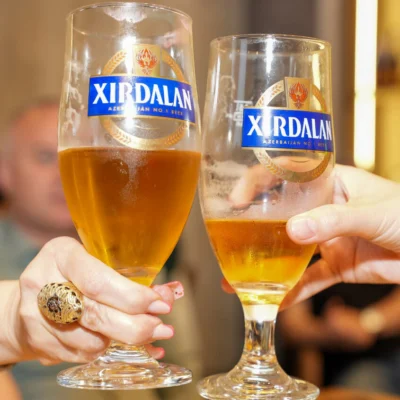Beer – tradition and modernity

That’s something we stopped arguing about a long time ago. Finding out who first brewed beer is as useless as finding out who first discovered the wheel. Some scientists even claim that beer has always existed. Archaeologists firmly claim that beer was first brewed in the Middle East several thousand years ago. We even have a clay vessel found in Israel with an image of people drinking beer. It dates back to 3400 BC.
Beer remains one of those drinks over which time has no control. A seemingly simple drink made from water, yeast and barley, but entire institutes are constantly working on its study and improvement, trying not to lose the unique magic of this drink and not to break this thin thread of magic and enchantment, stretched out to us from the depths of centuries.
This magical drink is brewed in different countries. It can be dark or pale, light or strong, made of barley or wheat, but it is always kind. Most people associate beer with the word goodness. When people hear about my profession as a brewer, they all immediately smile and only then do they start asking questions.
In our technogenic century of crazy speeds, lack of time and warmth of soul, people reach for beer, subconsciously feeling something pure and real in it. Perhaps this is the main reason why beer bars are still full, despite crises and various bans.
Beer has always been popular in Russia, perhaps because there was always a shortage of it. Beer was mostly produced unpasteurized, with a short shelf life. This was quite enough, as it did not get stale on the shelves. Although there were advantages – unpasteurized beer retained its taste better.
The lack of real quality control, the incessant demand, always exceeding the supply greatly affected the beer industry and contributed to the emergence of new, “Soviet” traditions, unfortunately, not the best… So, in Russia was born the unique tradition of drinking beer with salted fish. Everywhere the beer appetizer was supposed to emphasize the taste and aroma of this wonderful drink, but dry salted fish neutralizes, suppresses the taste of beer and causes a strong thirst. The harsh realities of the time and created sayings such as “Beer without vodka – money in the wind!” Fortunately, the wind of change in Russia has also affected brewers. And now the brewing industry in the country is gradually reviving. Excellent beer began to appear in various regions of the country, and it began to be exported. Russian beer began to win gold medals at prestigious beer championships. As Guinness fans say: Out of the darkness comes light!
There are countries in the world where beer traditions have not changed for centuries. One of these countries is England. Beer, and more specifically ale, has been popular in England for centuries. Originally there were “ale-houses”, small home inns where ale was brewed. These inns usually had a pole sticking out of the windows and an evergreen wreath hanging from the front door. This signified that the inn had fresh ale. As time went on, signboards also became necessary, and since the majority of the population was illiterate, they had to be colorful and clear.
There was no television in those old times and pubs became places for daily meetings and socializing. Over the years, real rituals of behavior in pubs have developed, which differ from the rules in other countries. In different countries, the waiter marks the orders or writes them down on beer coasters. In England, the ordered pays for the beer at once, and orders beer for the whole company at once. All participants order beer one by one, in so-called rounds. The low alcohol content of the popular mild ale (3.5% alk.) allows you to spend several such “rounds” and not get drunk. Snacks in pubs are quite simple and uncomplicated. Mostly salted peanuts, sausages, sandwiches, you can also find traditional English fish, usually served with fries. The pub closes and the last pint is announced by a bell hanging on the wall of the pub.
In addition to beer and snacks, English pubs, and not only English pubs, often offer a bit of play in between beers. Here you can find a pool table, as well as darts – a target for throwing arrows hung on the wall. You can take a breath between the next “round”, throw arrows, and at the same time check the degree of your intoxication. Live music is quite rare in English pubs, much more often you can find more democratic jukeboxes.
Prussian bars, Bavarian beer cellars and beer gardens are common in Germany. The atmosphere in these establishments is strikingly different from English beer pubs. In them waiters quickly serve visitors, carefully making sure that your mug does not remain empty. Beer is served with sauerkraut and pork in various forms, especially famous Bavarian sausages. The atmosphere in Bavarian beer halls is cheerful and noisy, as they say, the smoke is thick.
This country was one of the first to give the world a quality certificate “The Purity Law”. The act, created in 1516, was designed to regulate the price policy for the sale of beer, but that is not what made it memorable. The “Purity Law” clearly regulated the components from which beer should be brewed. The prohibition of various additives from herbs and roots, which could sometimes be harmful to human health, for the first time outlined the general rules of brewing. Of course, much has changed over the years, but some brewers in many countries around the world still follow the simple rules of the “Purity Law”: beer must be brewed from barley or wheat malt without any additives.
The official date of the birth of Czech beer is considered to be 1087, when beer lovers tasted a freshly brewed foamy drink and decided to document it in the annals. After that, brewing in the Czech Republic began to develop rapidly. In order to reduce the heat of competition, a special law “Beer Mile Rule” was issued, according to which brewers’ houses had to be located at least a mile away from each other.
The quality of Czech beer has a long history. Czechs have always revered this magical drink. In the Middle Ages, poorly brewed beer was poured out on the town hall square, and unscrupulous brewers were whipped and subjected to a large monetary fine, and the guiltiest were put on a collar and put on a chain in the middle of the square. The method was quite cruel, but judging by the results it was quite effective. The Czech brewers named St. Wenceslas as their patron saint, who apparently still helps them to this day.
Czech beer pubs are not distinguished by anything special. Their main characteristic is good beer and a rich menu, which, incidentally, also mostly consists of pork. They usually serve a good lager, and as an appetizer they often recommend pork knee with the same sauerkraut as a garnish.
In Belgian beer cafes you can find a real “beer paradise”. The abundance of beer brands is astonishing. The waiters are accordingly well trained and erudite in all about beer. You can find beers to suit all tastes and snack on a variety of seafood dishes, often exotic.
The United States has always been a land of contrasts. This also applies to beer. Microbreweries are very popular in this country, producing wonderful original beers, and large breweries also make true beer lovers happy. In addition to, to put it mildly, consumer beer, they sometimes produce real beer masterpieces. The general drinking culture in the country is quite low. American pubs are often characterized by excessively cold beer poured into a frozen beer mug. And overcooled beer is known to change its flavor not for the better. The widely advertised habit of drinking beer from the neck of the bottle is a shock to the true beer drinker. Drinking beer without smelling it and depriving oneself of the opportunity to enjoy its color and beautiful foam is not something a person who respects himself and what he drinks can afford. Unfortunately, this is not an individual problem; it is much more widespread than it seems at first glance.
The question of beer appetizers has always been considered very important. They vary from country to country depending on the culinary peculiarities of the region. I am happy to share with my readers one of the most popular beer appetizers from my “last life”. In Baku, where I was born, boiled peas were always served with beer. Here in Israel, you can solve this issue even easier. You need to buy a can of canned peas (חומוס שלם). Reheat it in the microwave, salt it steeply, sprinkle it with zartar (זרטאר) and serve it with properly chilled beer. The advantages of this appetizer are obvious: a can of canned peas can be kept in the cupboard for almost unlimited time, salt and zartar are always at home, to open the can and heat the contents take exactly two minutes. Cheap, fast, and most importantly – delicious! However, let’s get back to beer.
Beer, which originated in the Middle East, suddenly stopped being brewed throughout the region in the eighth century AD. This was due to the arrival of the Muslims. Islam prohibits, or rather restricts, the drinking of alcohol, but the recipe for beer was already known, and traders and seafarers spread it around the world. Many people of this region are still missing the happiness of enjoying this miraculous drink.
However, all is not so bleak in the Middle East. In a small country called Israel, a brewing boom started not so long ago. This is a country that has no long-standing beer traditions. In ancient times, beer was brewed here, but over the years it was discontinued. After years of neglect, it wasn’t until the 1930s that beer was brewed again in Israel. The first brewery “Palestine” was built by Baron Rothschild and French banker Gaston Dreyfus in 1934, before the establishment of the State of Israel. It was located on the grounds of a winery in Rishon le Zion. Visitors to the winery can still see the mosaic eagle on the site of the first Israeli brewery.
Beer traditions began to emerge as the action progressed. It is customary in Israel to serve salted nuts, pickles, and salted breadcrumbs with beer. However, the most important thing is not in the appetizers, but in the very attitude to beer. In Israel, beer is not the main purpose, but an attribute to something. Beer is drunk at celebrations, it complements friendly conversation, it quenches thirst. The call to simply go out for a beer is generally met with genuine bewilderment.
There are objective reasons for this. Until 1995, there was only one brewery in Israel for the whole country, producing only two brands of beer. It was only after the launch of the second large brewery that beer competition began in the country. The development of the beer market in Israel was also significantly influenced by the arrival of a million new residents who are no strangers to good beer.
Unfortunately, this has not fundamentally changed the attitude towards beer in general. Beer is still mostly looked at as something secondary, but beer culture is developing rapidly in the country. Beer festivals have become regular in Israel, home brewing centers have been created, new pubs with interesting beers for real connoisseurs have opened, the country’s first Russian-language beer news portal has been created and is successfully operating. It is very believable that in a few more years, visitors to pubs will not just ask for dark or light beer, and buyers in supermarkets will not only look at the price, but also read the label.















